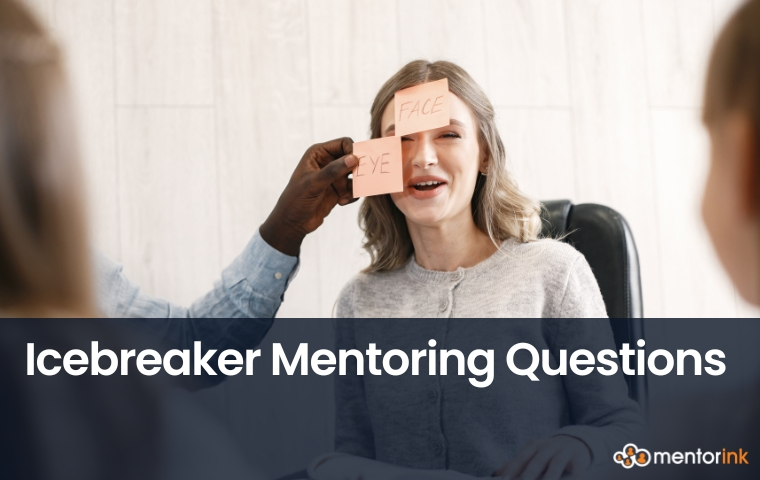
The power of the conversation is the keystone of mentoring. Breaking the ice, especially in the early stages of a mentor-mentee relationship, is essential for building trust and connection. That’s where icebreaker mentoring questions come into play. These thoughtfully crafted questions are intended to initiate meaningful, introspective, and frequently intimate dialogues between mentors and mentees. They help create a comfortable environment and set the foundation for a meaningful, long-term relationship built on openness and understanding. In order to create an environment for mentoring meeting you can use different methods. Coffee Roulette can be good option to create mentorship meeting environment.
Definition of Mentoring Question
A mentoring question can be defined as a purposeful inquiry posed during a mentoring conversation to facilitate deeper thinking, encourage exploration, and promote growth. Mentoring questions are not random or superficial, but they are designed to guide reflection, uncover insights, and stimulate learning. Mentoring questions serve as tools that help mentors understand the mentee’s goals, challenges, and values, while also encouraging the mentee to think critically about their own journey.
Unlike a standard conversation between mentor and mentee, mentoring is goal-driven, and the questions used must align with that intent. A good mentoring question also invites dialogue, sparks curiosity, and opens the door to meaningful exchange for mentees. Whether it is asking about past experiences, current struggles, or future aspirations, these questions help both mentor and mentee move from surface-level conversations to in-depth discussions that can truly transform personal and professional perspectives.
Icebreaker mentoring questions, in particular, can be defined as a subcategory of mentoring questions designed specifically for the beginning of a mentoring relationship. Their purpose is to ease any tension or nervousness that either party may feel.
These questions are usually lighter in tone, yet still thoughtful enough to offer insight. For example, asking a mentor, “What inspired you to enter your field?” or “Can you share a mistake that taught you something valuable?” may allow for a personal connection while gently initiating deeper conversation. Icebreakers are the warm-up before the real work begins and without them, mentoring relationships may struggle to get off the ground.
Importance of Posing Icebreaker Mentoring Questions to Mentors
While much of the focus in mentoring is often placed on supporting the mentee, establishing a two-way dialogue from the very beginning is crucial, and this includes mentees asking questions, too. Posing icebreaker questions to mentors allows the mentee to learn more about the mentor’s background, values, and journey, helping to humanize the mentor and build rapport.
Mentors are often seen as authority figures successful, confident, experienced. While this can be inspiring, it may also unintentionally create distance or intimidation, especially in newer relationships.
Icebreaker questions help dissolve those barriers. They signal that the mentee is curious, open to learning, and willing to engage beyond just receiving advice. Questions such as “What was your first job out of school?” or “Who was your biggest influence early in your career?” can reveal shared experiences and help both parties feel more connected.
In addition, mentors may not always know how best to initiate a mentoring session, especially in informal programs or new pairings. When mentees take the lead in asking thoughtful, non-invasive questions, it creates a shared space of curiosity and mutual respect.
This also sets a tone of active engagement, showing the mentor that the mentee is invested in the relationship, not just seeking quick answers but truly wanting to understand and grow.
Mentoring relationships thrive when both sides are comfortable being open and vulnerable. When mentors share their journeys successes, failures, and lessons learned, it creates a trusting environment where mentees feel safer sharing their own uncertainties or ambitions. Icebreaker questions pave the way for this openness.
How Icebreaker Mentoring Questions Affect Mentoring Activities
The impact of icebreaker mentoring questions goes far beyond the first meeting. Their influence can shape the tone, quality, and consistency of the entire mentoring relationship.
When icebreakers are used effectively at the beginning, they help establish a rhythm of open communication. This early comfort translates into ongoing honesty, better feedback exchanges, and more productive sessions.
Mentoring activities often include goal setting, performance reviews, career planning, and skill development. If a mentor and mentee have not built trust or comfort early on, these activities may feel forced or shallow. Icebreaker mentoring questions build that necessary foundation of connection and mutual understanding.
Examples of Icebreaker Mentoring Questions
Getting to Know Each Other
1. What inspired you to choose your current career path?
2. What’s something unique or interesting about you that most people don’t know?
3. What motivates you to get out of bed every morning?
4. If you weren’t doing your current job, what would you want to be doing instead?
5. How would your best friend describe you?
6. What’s one hobby you’ve always wanted to try but haven’t yet?
7. If you could travel anywhere in the world tomorrow, where would you go?
8. What’s one personal goal you’re currently excited about?
9. Who has had the most significant impact on your professional life?
10. What’s your favorite way to relax after a busy day?
Icebreaker Mentoring Questions for Professional Insights
11. What’s the best professional advice you’ve ever received?
12. What’s one thing you wish you knew when starting your career?
13. Can you share one professional accomplishment you’re particularly proud of?
14. What’s one skill you believe every professional should have?
15. If you could master one skill instantly, which would it be?
16. What challenges you the most in your current role?
17. What’s one habit that’s significantly improved your productivity or success?
18. Which professional achievement surprised you the most?
19. How do you typically approach problem-solving?
20. If you had unlimited resources, what professional project would you pursue?
Reflective & Thoughtful Icebreaker Mentoring Questions
21. What’s a meaningful book, podcast, or TED talk that influenced you deeply?
22. Can you share an experience where you learned from failure?
23. What’s one thing you’re eager to learn from this mentoring experience?
24. How do you handle stress and maintain balance in your life?
25. What’s a valuable lesson you’ve learned in the past year?
26. If you could advise your younger self, what would you say?
27. What personal strengths help you succeed professionally?
28. What’s the most valuable feedback you’ve ever received?
29. If you could spend a day shadowing anyone, who would it be and why?
30. What’s your favorite quote, and why does it resonate with you?


